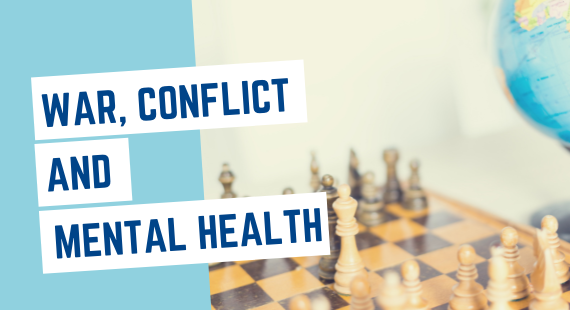
Making our own wellbeing a priority will be important in helping us to deal with news of war and conflict.
Professor Jim Lucey, Consultant Psychiatrist here at St Patrick’s Mental Health Services (SPMHS), recently shared some advice on how we can stay mentally well as news of the war in Ukraine unfolds.
Professor Lucey joined Dearbhail McDonald on RTÉ Radio 1 to discuss how we can deal with news of conflict. They started by noting how completely new or alien the concept of war feels to many of us in Ireland and Europe. Many of us are seeing upsetting headlines of attacks and bombings in Europe or becoming more familiar with words like “rations” and “refugees” for the first time. For younger generations in particular, our sense of shock is heightened because the nature and consequences of war in Europe are not in our living memory.
Professor Lucey explained, “The scale of it and impact of it is beyond words really… I’m old enough to remember my parents and grandparents referring to the wars they lived through, but we don’t have that reference point now… In many ways, we are in a curious moment because this makes no sense to us in 21st century European life.”
Processing trauma
When asked about how we can process the trauma and uncertainty we feel about the situation in Ukraine, Professor Lucey advised that, in his opinion, “what we need to do is value our own appreciation of this in a sense, so that we can maintain our own mental health and be of value to the collective: speaking out for human rights, for peace, for justice.” He explained how standing up for these rights and values is important, but we need to do this while we “stay within our own wellness”.
Professor Lucey suggested that one first step we can take to process what’s happening in a healthy way is to “try and make sure we stick with balanced information”. He advised “being mindful of the information and media coverage we’re getting so that we aren’t doomscrolling or sucked into a vortex of nihilism”.
Another vital step is to control what we can in our lives. Professor Lucey explained, “we are actually much better off if we can maintain our stress levels, do something about our anxiety, try not let our sadness grow to despair and depression. We know the mechanisms for doing that: they include self-care; they include trying to find the ways of mindfulness or, indeed, some kind of reference to friends, family, society, keeping together with people… Looking after our own wellbeing becomes something that’s a natural consequence of that.”
Being resilient
Dearbhail McDonald turned to look at how people can stay strong in the face of uncertainty or panic about the wider outbreak of war. She noted that the word “resilience” was used a lot during the coronavirus pandemic, and wondered if it was appropriate in this case. While Professor Lucey did agree that the term was frequently brought up during the pandemic, he reinforced that resilience does have a very solid basis and is very important at times like these.
To demonstrate this, Professor Lucey told how he likes “to remind people of the Second World War story of Michael Rutter, who is the father of child psychiatry and who was himself evacuated through the U-boat war across the Atlantic”. As a child, Michael Rutter spotted that some people could sustain things, and he spent the rest of his life trying to look at the ways in which people became strong: “what he found was that resilience is a universal human quality that each of us can sustain for each other”.
Professor Lucey explored some of the difference factors or domains of resilience that makes us strong and have a sense of security in ourselves. For him, “this is a time for truth, a time for honesty and a time for going to the data”; for looking at our positive values, talents and interests; and for connecting with others socially and turning to our friendships.
Moving beyond fear
The conversation ended by looking at the simple things we can do every day to look after our mental health and wellbeing and to avoid fear and overwhelm.
Professor Lucey recommended that we start with “the bedrock of things”: getting enough sleep and exercise, following a healthy diet, and “trying to connect with each other and ourselves in compassionate ways”.
He finished by inviting people, rather than looking at the next news bulletin, to ask themselves “what they used to do to connect to positivity and goodness” and make that into something they do today again.

